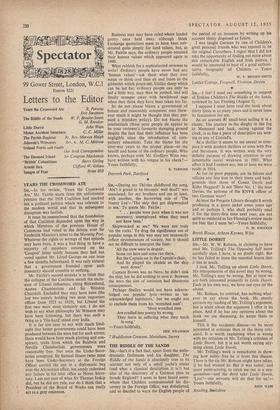LITTLE DORRIT SIR,—Mr. W. W. Robson, in claiming to have
read Mr. Trilling's The Opposing Self more carefully than I have, is no doubt right. But he has failed to learn the essential lesson that it has to teach.
I took Mr. Trilling up about Little Dorrit. My interpretation of this novel may be wrong. Mr. Trilling's may be wrong. But at least we are both interested primarily in Little Dorrit. Each in his own way, we have our eyes on the object.
Mr. Robson, by contrast, has nothing what- ever to say about the book. He sternly corrects my reading of Mr. Trilling's argument, but is silent about the argument I offer in its place. And if he has any opinions about the book we are discussing, he keeps them to himself.
This is the academic disease—to be more interested in criticism than in the thing criti- cised. It is worth explaining what is wrong with my criticism of Mr. Trilling's criticism of Little Dorrit, but it is not worth saying any- thing about Little Dorrit.
Mr. Trilling's work is remarkable in show- ing how nobly free he is from this disease. There is the tip Mr. Robson might have taken, if he had wanted to. But it was easier, and more point-scoring, to catch me out in a mis- quotation—and the devil take Little Dorrit. 'Live?—our servants will do that for us,'— Yours faithfully, Reading, Berkshire
JOHN WAIN


































 Previous page
Previous page